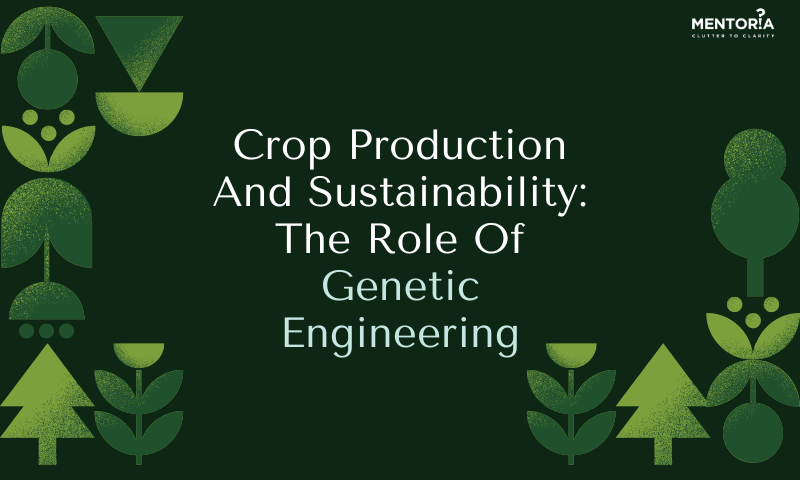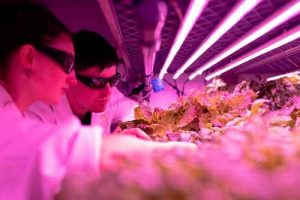Crop Production And Sustainability: The Role Of Genetic Engineering

Jump to Section
Do you ever wonder how the world’s growing population will be fed sustainably? Genetic engineering has been revolutionising crop production by helping to increase yields, produce crops with better nutritional value, and improve resistance to pests and diseases. With the ability to identify and manipulate genes, scientists have created drought-resistant crops that require less water and crops that can grow in nutrient-poor soils.
The use of genetic engineering in agriculture has also contributed to the development of more sustainable farming practices that reduce the need for pesticides and fertilisers. Let’s dive into the exciting world of genetic engineering and its role in creating a sustainable future!
Disease Resistance: Protecting Crops Like A Superhero
Did you know that genetic engineering can help crops become resistant to diseases? Yes, you heard that right! And we all know how devastating diseases can be for crops and the environment. But with genetic engineering, scientists can modify crops to become immune to certain diseases, reducing the need for harmful pesticides and herbicides. It’s like giving your favourite superhero an extra power to fight the villains! From papayas to potatoes, genetic engineering has already helped crops resist diseases, and this trend is only going to grow in the future. So, buckle up and get ready to witness the power of genetic engineering in crop production and sustainability!
Drought Tolerance: Saving Crops From The Heat
Drought is a major problem that affects crop production all over the world. But don’t worry, genetic engineering is here to help! With genetic engineering, crops can now be modified to be more drought-tolerant and resilient. Imagine plants that can thrive even in the harshest of conditions! It’s like having a superhero crop that can withstand extreme heat and still give a bountiful harvest. Think of it like the “Wakanda forever” of crop production. So, whether you’re a farmer or just someone who loves the environment, you can’t help but be excited about the future of crop production and sustainability.
Improved Nutrition: Building Stronger Crops For A Healthier World
Genetic engineering can also help in improving the nutritional value of crops. That’s right! By modifying genes responsible for nutrient production, we can create crops that are more nutritious and can help in fighting malnutrition in underprivileged communities. Imagine having corn with more vitamin A, rice with more iron or potatoes with more protein! It’s like something straight out of a sci-fi movie, isn’t it? But it’s happening now, and it’s just one of the many ways genetic engineering is revolutionising crop production and sustainability.
Increased Yield: Growing More Food With Less Resources
Did you know that genetic engineering can help farmers increase their crop yields? By genetically modifying crops, scientists can make them more resistant to pests and diseases, and better able to survive harsh weather conditions. This means that farmers can grow more crops, which in turn can help to feed more people and reduce the environmental impact of agriculture. It’s like giving your crops a superpower, just like how Iron Man has his suit to fight villains. With genetic engineering, farmers can be more sustainable and efficient in their crop production, all while saving the world from hunger and environmental degradation. Exciting, isn’t it?
Reduced Use Of Pesticides: Minimising Harmful Chemicals In Agriculture
Are you a fan of superhero movies? Well, imagine if there were a superhero that could fight off pests and diseases, without needing to use harmful chemicals. That’s where genetic engineering comes in! Through genetic modification, crops can now be engineered to resist pests and diseases, reducing the need for harmful pesticides. Not only does this make our food safer to consume, but it also reduces the negative impact of pesticide use on the environment. It’s like having our very own superhero working tirelessly to protect our crops!
Environmental Sustainability: Engineering A Greener Future For Agriculture
Genetic engineering is not only revolutionising crop production, but also contributing to environmental sustainability. Through the use of genetically modified crops, farmers can reduce the need for harmful pesticides and herbicides, leading to a decrease in environmental pollution. Additionally, genetically modified crops can be engineered to have higher yields and be more drought-resistant, allowing farmers to grow more food using less land and water. This is crucial for ensuring sustainable agriculture and preserving our planet’s natural resources. With genetic engineering, we have the power to grow food more efficiently and responsibly, paving the way for a sustainable future.
Genetic Engineering With Mentoria!
Genetic engineering is a promising technology that can greatly benefit crop production and sustainability. The use of genetic engineering can also reduce the need for harmful pesticides and herbicides, leading to a more sustainable and environmentally-friendly approach to agriculture. With ongoing research and development, the future of genetic engineering in crop production looks bright, and it will continue to be an important tool in meeting the growing demand for food while also preserving our planet’s resources.
We’re here to provide you with all the help! Kick-start your journey with Mentoria and discover the right fit for you. Feel free to call us to speak to our career mentors and choose the right guidance plan that suits your needs.
Mentoria’s career guidance programme enables you to choose your perfect fit from 3 streams, 850+ courses, and 12,000+ careers, and discover what will bring out the best in you.









